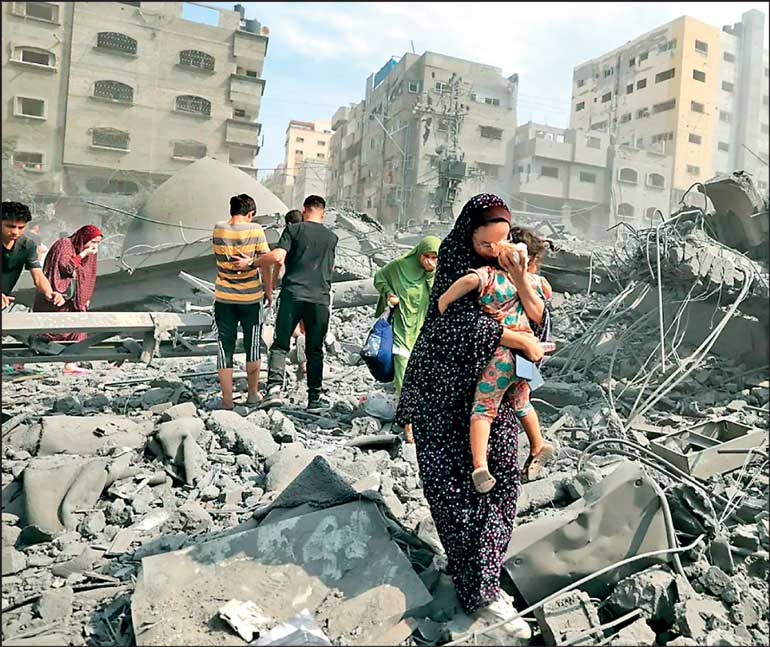Friday Feb 20, 2026
Friday Feb 20, 2026
Saturday, 10 February 2024 00:50 - - {{hitsCtrl.values.hits}}

By Mohammed Abu-Nimer
The war on Gaza is about to complete its fourth month. As of late January, this campaign of destruction has killed over 25,000 people (two-thirds of them women and children), destroyed tens of thousands of homes and displaced over 1.5 million Palestinians, squeezing them into a small southern corner of Gaza. On the Israeli side, 1,139 people were killed in the 7 Oct. attack by Hamas, and the war on Gaza has caused over 125,000 Israelis to evacuate their homes and settle in hotels or temporary houses.
The war on Gaza has reverted the Israeli-Palestinian conflict back to 1948. Recently, there has also been an increase in expressions of antisemitism and Islamophobia around the world.
There will be no clear victory for Israelis or Palestinians. This war has, in many ways, made victims of all of us: Palestinians, Israelis and everyone around the globe.
Religious leaders and their institutions are also caught in this polarisation.
Considering this bleak reality, how can we restore confidence in interfaith peacebuilding in the Middle East and even globally?
Having written many articles and taught many courses on the role of religious leaders in conflict situations, I believe we know what type of actions can and should be done in such a reality. The following are some of these joint actions that can be carried out by Muslim, Jewish, Christian, Buddhist and Hindu religious actors (leaders and the faithful alike) and their institutions.
A prophetic voice for peace
Interreligious leaders and their organisations can be a clear prophetic voice for peace and justice. They can remind us all of the sacredness of human lives. In each faith group, there are many stories in which religious leaders utilised their prophetic voice to call for an end to wars and violence, and to restore justice and peace in their communities. In the current context of Israel-Palestine, religious leaders can at least agree on two calls.
The first is a call for a cease-fire that would include a joint interreligious call to stop all attacks on civilians, including the daily massacres in Gaza. This could be a powerful message that brings together Muslims, Jews and Christians in our communities. The second is a call for the release of all hostages on both sides, as stated in the Muslim World League petition, and for an end to the future targeting or hostage-taking of any civilians. Grounded in their Abrahamic theological beliefs in the sacredness of life, religious leaders can launch joint campaigns to reach out to their own communities.
A witness of truth
Interreligious leader delegations can plan trips to Gaza (or Gaza’s borders), the West Bank and Israel to act as witnesses to the truth on the ground. They can report their observations and share stories they hear from both Palestine and Israel. This witness can become a platform for their followers to adopt or act upon.
Aid and relief
The war on Gaza has caused a humanitarian disaster beyond any normal measures of war or natural disasters. The pressing need for aid and relief is enormous. Interreligious joint actions can be organised around the delivery of this aid and relief. A call to support the survival of Gazan children and women can be made from inside the church, mosque and synagogue. By depoliticising aid to refugees in Gaza, interreligious leaders can help to bridge the gap between communities in Europe and America that have become further polarised as a result of the war on Gaza.
Healing
For centuries, religious leaders have acted as spiritual healers during the trauma of war. In the current war on Gaza, millions of Palestinians and Israelis have been traumatized. Muslim, Jewish and Christian religious leaders can offer a joint platform for the healing of pain and victimisation. They can gather the resources of their communities to respond to the needs of women, children and all victims.
There are many other efforts that religious peacemakers can engage in during this war. The challenge of carrying out joint interreligious action is never the lack of options during such wars. It is instead the inability or hesitancy of leaders and followers to take a nonviolent, principled stand against killing, regardless of the justification. Leaders with courage to engage in joint interreligious actions of solidarity perceive their role as peacemakers, and not only as guardians of their faith tradition’s rituals and symbols. Historically, those religious peacemakers take clear stands against racism, discrimination and apartheid, both in their own communities and outside. Such leaders refuse to remain silent when genocide, ethnic cleansing or massacres are being carried out and even live streamed. And as it relates to the war on Gaza, the silent and complacent religious and interreligious leaders and organisations cannot claim that they did not know.
To save whatever remains of the reputation, credibility and legitimacy of interfaith peacemaking and interreligious dialogue in the Israeli-Palestinian conflict, we need these voices to be heard now more than ever.
This edited article is produced from a longer version published in America; The Jesuit Review edition of 8 February, 2024 titled ‘Interfaith peacemakers cannot remain neutral on Gaza.’ What is primarily selected for publication in this page are the (un edited) suggestions made by Mohammed Abu-Nimer for the way forward to reach a credible and much needed peace creation pertaining to Israel and Palestine.
The writer is an American expert on conflict resolution and dialogue for peace. He is a full professor at the American University School of International Service in International Peace and Conflict Resolution in Washington, DC, the largest school of international relations in the United States